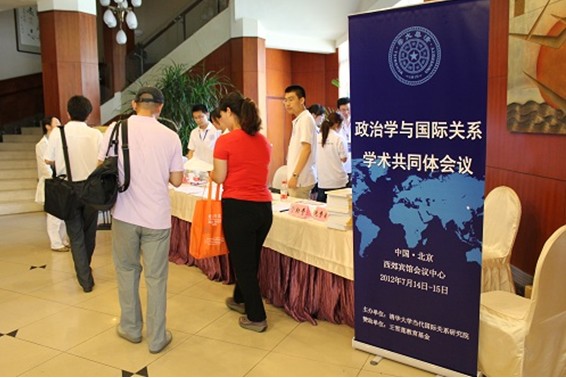China should speak its own language, scholars say at IR meeting

Attendees to the Annual Meeting of Chinese Community of Political Science and International Relations 2013 registering at Xijiao Hotel, July 6th, 2013 in Beijing
On July 6-7th, the Annual Meeting of Chinese Community of Political Science and International Relations 2013 was held in Beijing. The meeting is organized by the Institute of Modern International Relations of Tsinghua University and sponsored by the Wang Xuelian Education Foundation. The meeting has developed into an important Chinese academic event since 2008.
Theoretical innovation does not happen overnight
Discussing how to promote theoretical innovation in international relations, Zhang Ruizhuang, director of the Institution of International Studies at Nankai University, emphasized that foremost, Chinese scholars should not try to propose new theories simply from a place of impetuousness or impatience to see progress in the field. “Some think international relations has been on the decline in China because it didn’t generate any new theories with real explanatory power to interpret the post-Cold War geopolitical reality that rapidly emerged,” Zhang said. “It’s normal for a discipline not to make important theoretical breakthroughs in 5 or 10 or even 20 years.”
Simply conducting literature reviews of classical theories will not offer much traction for real theoretical innovation, said Yan Xuetong, director of the Institute of Modern International Relations of Tsinghua University. Yan advised that Chinese scholars will derive more value from absorbing the existing knowledge and rational elements of classical theories.
Analyzing the potential for theoretical innovation, Yan applied the structural realist concept of systemic pressure to China's rise. He proposed that China's trajectory can be broken down into three stages: preparation, take off and sprint. Assuming that all else remains equal in the international system, because the speed of rising changes, the systemic pressure facing China will still change as the speed at which it rises changes--the later the stage, the more pressure it will face. At different stages, the structural constraints facing China will also differ, and so at different the stages of rise, China should adopt different strategies accordingly, Yan concluded.
Chinese self-discipline provides fresh ideas for IR
“We should not always be using western analytical terms like ‘soft power’ when we’re talking about international relations,” said by Wang Yiwei, a distinguished visiting professor at Renmin University of China. “As a civilized nation with a rich historical heritage, we have plenty to draw on from which we can build our own vocabulary.”. Besides learning from the international relations theories of developed western countries, the common goal of Chinese international relations scholars is to form a uniquely Chinese understanding and approach to international relations and establish a Chinese theory of big power diplomacy based on China's own historical culture and political thought, Wang said.
China ought to introduce new concepts to the world, said Wang Fan, a professor from China Foreign Affairs University. Western values are of monopolistic, exclusive and lacking of integrity whereas Chinese values are holistic and inclusive—these are the areas where we can make real breakthroughs in thinking and theories, Wang urged.
Wang Fan also emphasized the view of self-discipline in Chinese culture. Traditional western thought, Wang said, noting the contrast with the Different from requiring others in The traditional western way of thinking holds that one first makes demands of others, said Wang, noting the contrast with the Chinese axiom “one should sweep before one’s own door” and the Confucian “silver rule”: “don’t do unto others what you would not have them do unto you.” “Blaming others in the face of difficulty, rather than exercising self-discipline, has become the norm in contemporary international relations. Advocating self-discipline in international relations--when choosing between mutual restraints, first stressing self-restraint--is a principle that has a unique significance for the stability of the international community,” Wang Fan concluded.
Three focal points for think tanks
Changes in international structure and the peaceful development of China are significant research topics for think tanks. Fu Ying, Chairperson of the Foreign Affairs Committee of the National People’s Congress, listed three focal points for think tanks to serve the cause of diplomacy in a changing world. First, the study of international issues needs to be grounded in the diplomatic reality. To this end, think tanks should establish positive interaction with decision-making bodies. Second, Chinese think tanks should focus on major international relations issues facing China, such as how to define China’s position in the world. Researchers need to present opinions that can be accepted both at home and abroad. Based on this view, they can construct a corresponding great power strategy and theory of big power diplomacy. Third, think tanks are public institutions with a responsibility to society; this is a principle to which they should adhere. The capability and awareness they channel are meant to be provided as public goods for the betterment of Chinese society and even for the international community. As for China’s responsibility on the international stage, the international community looks to China with many expectations and at the same time China is the subject of many discussions. Here, researchers in relevant fields can help introduce China’s model of behavior and principles of action to international observers so as to help them better understand China, and enable China to play a more constructive and effective role in the world.
The Chinese version appeared in Chinese Social Sciences Today, No. 473, July 10, 2013
Translated by Wang Wei
Copy Editor: Charles Horne
Chinese link: http://www.csstoday.net/xueshuzixun/guoneixinwen/82151.html
